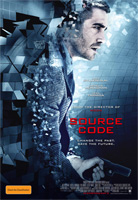Jake Gyllenhaal Southpaw
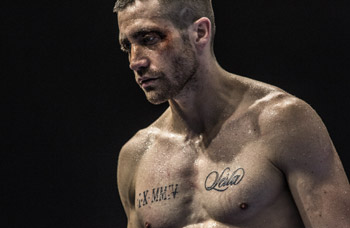
Jake Gyllenhaal Southpaw
Cast: Jake Gyllenhaal, Forest Whitaker, Rachel McAdams, Rita Ora, Naomie Harris, 50 Cent
Director: Antoine Fuqua
Genre: Drama
Rated: MA15+
Running Time: 124 minutes
Synopsis: A boxer fights his way to the top, only to find his life falling apart around him.
Southpaw
Release Date: August 20th, 2015
About The Production
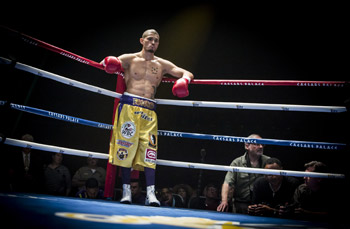 A love of boxing was certainly not what drove Academy Award® nominated actor Jake Gyllenhaal to star in Southpaw. In fact, Jake Gyllenhaal was essentially unfamiliar with the sport before signing on, though he now calls himself an avid fan. For him, director Antoine Fuqua, who's a dedicated boxer himself and trains every day, was the main reason for his interest in the film to begin with. Having met years before, Antoine Fuqua insisted that he'd love to direct the already-acclaimed actor in something that audiences had never seen before. While Jake Gyllenhaal initially chalked the claim up to just being typical Hollywood talk, Antoine Fuqua eventually made good on his word. Determined not to make Southpaw 'just another boxing movie," the filmmaker was determined to find an actor willing to take on the role of Billy 'The Great" Hope in the most literal, brutal way conceivable – no doubles, very few effects, little reliance on editing – just straight training and as faithful a replication of the boxing world as possible, right down to the camerawork. 'The reason why I like to play certain characters is because of the doubt that I have in my ability to do it," says Jake Gyllenhaal. 'Antoine Fuqua believed in me years before I even knew, and then in the process he believed I could do it. I think that belief in anybody allows you to go do your best work."
A love of boxing was certainly not what drove Academy Award® nominated actor Jake Gyllenhaal to star in Southpaw. In fact, Jake Gyllenhaal was essentially unfamiliar with the sport before signing on, though he now calls himself an avid fan. For him, director Antoine Fuqua, who's a dedicated boxer himself and trains every day, was the main reason for his interest in the film to begin with. Having met years before, Antoine Fuqua insisted that he'd love to direct the already-acclaimed actor in something that audiences had never seen before. While Jake Gyllenhaal initially chalked the claim up to just being typical Hollywood talk, Antoine Fuqua eventually made good on his word. Determined not to make Southpaw 'just another boxing movie," the filmmaker was determined to find an actor willing to take on the role of Billy 'The Great" Hope in the most literal, brutal way conceivable – no doubles, very few effects, little reliance on editing – just straight training and as faithful a replication of the boxing world as possible, right down to the camerawork. 'The reason why I like to play certain characters is because of the doubt that I have in my ability to do it," says Jake Gyllenhaal. 'Antoine Fuqua believed in me years before I even knew, and then in the process he believed I could do it. I think that belief in anybody allows you to go do your best work."
Given Jake Gyllenhaal's intensive immersion into the role of Billy, it can come as surprise to learn that the film was originally intended for a very different performer: hip hop artist Marshall Mathers, better known as Eminem. Sons Of Anarchy creator Kurt Sutter, whose father was at one time a semi-professional fighter, was first approached by the rapper's team three years ago to potentially do a remake of the 1979 boxing classic The Champ. Kurt Sutter disagreed with the idea, however, of simply doing a reboot of an old film. 'I try not to do anything that feels too derivative, so my pitch was at that point to tell Marshall Mathers's story through the analogy of boxing." Serving as inspiration for character Billy Hope's downward spiral was Eminem's own real-life struggle with the death of his best friend, Proof. His close relationship with his daughter Hailie Jade was also a key piece in informing the film's other crucial theme: fatherhood. When the musician dropped out of the project at the last minute to focus on an album instead, Kurt Sutter and Antoine Fuqua went back to the drawing board and, ultimately, won the interest of Jake Gyllenhaal. He remains enthusiastically connected to the film however – his single 'Phenomenal" is the first song off the movie's official soundtrack, which he is also executive producing and releasing on his Shady Records label. 'He just seems to have a natural ability to understand the world – the highs, the lows and emotional roller coaster," explains Antoine Fuqua as to why he insisted that Eminem remain involved. In fact, the rapper was the first person he showed the film too when it was done. 'I wanted to see if he felt it," he says. 'He's somebody who's gone through his own darkness. If he walked out of the room feeling it even more, then I knew I did my job."
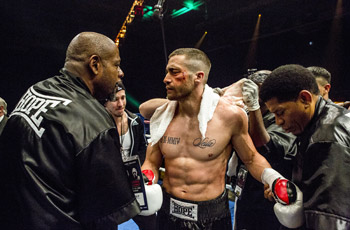 Together with Kurt Sutter, Antoine Fuqua and Jake Gyllenhaal were determined to craft a film that was both a realistic ode to the sport and a complex but relatable tale of familial and personal hardship. Jake Gyllenhaal notes: 'The thing that intrigued me from the get-go was the idea that Billy's a guy who has gotten by on his rage and his own anger – made a career out of it, had great success and made lots of money from it. That anger can actually indirectly destroy you. Ultimately for me, and know for Antoine Fuqua as well, this is a story about a man coming to grips with his own anger, and the idea of what it is to be a father." Kurt Sutter also notes that after going over the script with Antoine Fuqua and Jake Gyllenhaal, the approach to the script began to take shape from a specific metaphor for the character's personal journey to a more far-reaching theme. 'I realised that it really wasn't one man's story," says Kurt Sutter. 'It was really this universal story about redemption, overcoming obstacles and personal demons, and putting others before you." What was also agreed upon between the director, writer and lead actor was that the boxing film genre comes with so many familiar tropes, and that they wanted to do their best to steer Southpaw in a different, fresh direction.
Together with Kurt Sutter, Antoine Fuqua and Jake Gyllenhaal were determined to craft a film that was both a realistic ode to the sport and a complex but relatable tale of familial and personal hardship. Jake Gyllenhaal notes: 'The thing that intrigued me from the get-go was the idea that Billy's a guy who has gotten by on his rage and his own anger – made a career out of it, had great success and made lots of money from it. That anger can actually indirectly destroy you. Ultimately for me, and know for Antoine Fuqua as well, this is a story about a man coming to grips with his own anger, and the idea of what it is to be a father." Kurt Sutter also notes that after going over the script with Antoine Fuqua and Jake Gyllenhaal, the approach to the script began to take shape from a specific metaphor for the character's personal journey to a more far-reaching theme. 'I realised that it really wasn't one man's story," says Kurt Sutter. 'It was really this universal story about redemption, overcoming obstacles and personal demons, and putting others before you." What was also agreed upon between the director, writer and lead actor was that the boxing film genre comes with so many familiar tropes, and that they wanted to do their best to steer Southpaw in a different, fresh direction.
In order to build a strong foundation for an exceptionally realistic boxing film, Antoine Fuqua enlisted the services of legendary trainer and fight choreographer Terry Claybon. A former professional fighter who won three Golden Glove Championships and retired undefeated, Terry Claybon has worked with some of entertainment's biggest names, including Denzel Washington, Kevin Spacey, Nicolas Cage, Matt Damon and Ben Affleck. Claybon also has a role in the film as T, assistant to Forest Whitaker's character Tick Willis. The two met over seven years ago when Terry Claybon worked with the director for his film Training Day. Antoine Fuqua approached him about Southpaw about three years prior to the film's eventual shoot, when musician Eminem was in talks to play the lead role. On what makes Antoine Fuqua unique as a helmer of a boxing film, Terry Claybon notes: 'The difference is that Antoine Fuqua knows boxing. He's been in the ring, he's boxed, he's sparred. So if he sees something on the screen and it doesn't look real, he's able to catch it really fast. He has a quick eye on boxing."
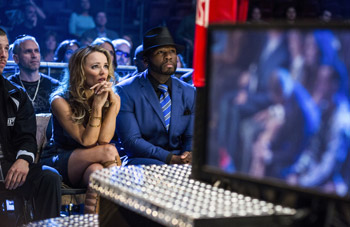 Using Kurt Sutter's script as a kick-off point, Jake Gyllenhaal and Antoine Fuqua sought to create a seemingly real Billy Hope in tandem through a long period of patient, excruciating work. The director and actor chose to train together with Terry Claybon – who traveled everywhere with them – nearly every single day over the course of six months, learning the intricacies of a boxer's technique, physicality and mentality. In those months, they worked twice a day, with Antoine Fuqua usually attending the first training session of the day in order to be present as the character organically took shape. 'Antoine Fuqua decided that he would come with me on the physical journey," recalls Jake Gyllenhaal. 'It was amazing to have your director there with pushing you every day. That motivation and sacrifice is what drove both of us. I think that energy is in the film." Kicking off with a run – anywhere in between two and ten miles – the six-hour daily program then included jumping rope, working mitts and bags, learning technique and footwork, and conditioning exercises such as sprints, pull-ups and sit-ups.
Using Kurt Sutter's script as a kick-off point, Jake Gyllenhaal and Antoine Fuqua sought to create a seemingly real Billy Hope in tandem through a long period of patient, excruciating work. The director and actor chose to train together with Terry Claybon – who traveled everywhere with them – nearly every single day over the course of six months, learning the intricacies of a boxer's technique, physicality and mentality. In those months, they worked twice a day, with Antoine Fuqua usually attending the first training session of the day in order to be present as the character organically took shape. 'Antoine Fuqua decided that he would come with me on the physical journey," recalls Jake Gyllenhaal. 'It was amazing to have your director there with pushing you every day. That motivation and sacrifice is what drove both of us. I think that energy is in the film." Kicking off with a run – anywhere in between two and ten miles – the six-hour daily program then included jumping rope, working mitts and bags, learning technique and footwork, and conditioning exercises such as sprints, pull-ups and sit-ups. Because Billy is supposed to fight as a light heavyweight, Jake Gyllenhaal had to work to get down to 175 pounds, about fifteen less than his normal weight. 'It was six months of very intense training and learning the skill of boxing in the most rudimentary way," he says. Notes Terry Claybon of Jake Gyllenhaal's preparation: 'Jake Gyllenhaal was there to take boxing way quicker than I anticipated. He came in with an open mind, whereas most guys com in too macho."
Jake Gyllenhaal's journey to embody his character didn't just stop at the physical level. For him and Antione Fuqua, entering into and understanding the mindset of a boxer was equally important in doing the justice to the script and role. 'Most people think it's all about the physical when it comes to boxing," explains Terry Claybon. 'But mentally you've got to prepare yourself just like a real fight, and go out there and be able to establish a different type of style for each fight." Along with the gruelling training routine, there was also an immersion into the world of fighters taking place which was key to making Billy Hope come alive on screen, with the actor spending all of his time in the gym surrounded by professionals and ringside, observing match after match and even visiting world champion Floyd Mayweather's training facility. 'The body will only function as far as the mind," notes Jake Gyllenhaal. 'I didn't really spend much time doing anything else or socializing in any other way."
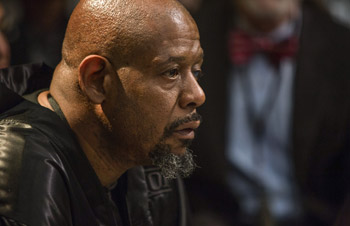 The approach in Southpaw was very much in line with his standard practice in preparing for performances, seeking to become the character rather than just play it. 'After a while what happens is you pick up the molecules of the world that you're in. I love to make things unconscious as an actor, and that takes time. When you play a character and you're in the world enough, you carry the molecules of that thing." From preparation to the completion of shooting, Jake Gyllenhaal developed an overwhelming respect for what actual boxers must endure mentally and physically. 'There is a legitimate question of life and death when you step in that ring that's unlike pretty much any sport and anything in society with the exception of going into the military," he observes. 'I think in a way it's a beautiful metaphor for life in that you come into the ring on your own, you leave that way and the journey is yours. As a fight fan, to watch the strength it takes to be a professional fighter – the will, the preparation, the discipline and the artistry – is really moving to me." Antoine Fuqua shares a similar, if not even greater, passion and respect for the sport. Southpaw is not the first set of his on which he trained as a fighter; in fact, he makes sure there's a ring and a gym on hand at each of his film shoots. 'I find boxers to be the most vulnerable of all athletes of all because they leave a piece of themselves in the ring every time. '
The approach in Southpaw was very much in line with his standard practice in preparing for performances, seeking to become the character rather than just play it. 'After a while what happens is you pick up the molecules of the world that you're in. I love to make things unconscious as an actor, and that takes time. When you play a character and you're in the world enough, you carry the molecules of that thing." From preparation to the completion of shooting, Jake Gyllenhaal developed an overwhelming respect for what actual boxers must endure mentally and physically. 'There is a legitimate question of life and death when you step in that ring that's unlike pretty much any sport and anything in society with the exception of going into the military," he observes. 'I think in a way it's a beautiful metaphor for life in that you come into the ring on your own, you leave that way and the journey is yours. As a fight fan, to watch the strength it takes to be a professional fighter – the will, the preparation, the discipline and the artistry – is really moving to me." Antoine Fuqua shares a similar, if not even greater, passion and respect for the sport. Southpaw is not the first set of his on which he trained as a fighter; in fact, he makes sure there's a ring and a gym on hand at each of his film shoots. 'I find boxers to be the most vulnerable of all athletes of all because they leave a piece of themselves in the ring every time. 'Along with Jake Gyllenhaal and Antoine Fuqua, Terry Claybon also worked with cast members Victor Ortiz, Miguel Gomez, Forest Whitaker and Rachel McAdams. While Victor Ortiz and Miguel Gomez are actual boxers on the professional and amateur levels, respectively, Forest Whitaker and Rachel McAdams felt it was equally important for them to understand the world of fighting through Terry Claybon's expertise.
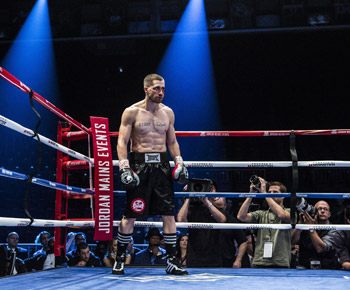 Playing Tick Willis, the humble but tough trainer who's there to guide Billy when no one else will, Forest Whitaker was tasked with shaping a very particular sort of character. While he serves as a mentor and ultimately a savior for Billy, he privately carries demons of his own. 'Working with Forest Whitaker on the character Tick was really different because Forest Whitaker knows a lot of martial arts, but different styles, so he really had to pick it up fast," remarks Terry Claybon.
Playing Tick Willis, the humble but tough trainer who's there to guide Billy when no one else will, Forest Whitaker was tasked with shaping a very particular sort of character. While he serves as a mentor and ultimately a savior for Billy, he privately carries demons of his own. 'Working with Forest Whitaker on the character Tick was really different because Forest Whitaker knows a lot of martial arts, but different styles, so he really had to pick it up fast," remarks Terry Claybon. 'For the mental part, he watched the fights, he studied the game and he really did his homework to take the character to another level." In the end, Forest Whitaker's goal was to paint a picture of Tick as the inspiration for Billy to become a more patient boxer, resilient to his own rage, keen on defensive skills and understanding of his own accountability. Sutter, who worked with Forest Whitaker on The Shield, had breakfast with the actor to discuss the role of Tick, but the two ended up talking about samurais for an hour and a half instead. 'Forest Whitaker is a very spiritual cat," notes Kurt Sutter. 'He loves the idea of playing these characters that are sort of samurai masters and spiritual gurus who guide without guiding." For Rachel McAdams, it was crucial to not just play the role of Billy's wife Maureen, but to tackle it with an understanding of the sport as a real-life wife like her would have had. Says Terry Claybon, 'Rachel McAdams wanted to really feel and understand what a fighter goes through so she can get an understanding of, when her husband's in there fighting, what he's going through. She was taking boxing with me so she could get gutted out, per se, and get a real feel of what it takes to be a fighter." Adds Antoine Fuqua on Rachel McAdam's character preparation: 'When she says -You're taking too many punches,' she actually understands that because she was around it so much."
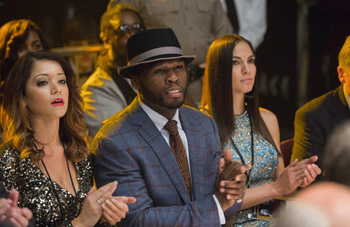 Two other key pre-production decisions that Fuqua needed to tackle were filling the roles of Leila, Billy and Maureen's precocious, loving and intelligent daughter, and Jordan Mains, Billy's lifelong friend and manager. Jake Gyllenhaal attended a New York casting session with Antoine Fuqua and introduced himself to the kids there, under the director's instruction, in character as Billy. The two knew instantly upon meeting 12 year-old stage and screen actress Oona Laurence that she was the Leila they needed. Laying out a set of dolls and explaining them to Jake Gyllenhaal in a British accent without flinching, Oona Laurence convinced the actor and director that no one else could play her part. 'I needed a kid who could handle Jake Gyllenhaal and not be scared of him," says Antoine Fuqua. 'And she went toe-to-toe with him." He had been in talks with artist and entrepreneur Curtis '50 Cent" Jackson for a long time about working on a film together, but had yet to be able to find the proper role for him. After noticing that Curtis Jackson had gotten into the business of boxing promotion with his company SMS Promotions and spending time with athletes such as Floyd Mayweather, he realised he might fit into plans for Southpaw. Reading the part of Jordan in Kurt Sutter's script again, the filmmaker felt that like every other actor in the film, whoever played this role had to do so with immense authenticity. 'I needed Jordan to be a guy that's in the grey," he notes. 'He's not a bad guy – he's a businessman. That's 50." The two met, along with Jake Gyllenhaal, at the Church Street Boxing Gym in New York for a few hours to discuss boxing and business, made a phone call to executive producer Harvey Weinstein, and a decision was made: 50 Cent would play Jordan.
Two other key pre-production decisions that Fuqua needed to tackle were filling the roles of Leila, Billy and Maureen's precocious, loving and intelligent daughter, and Jordan Mains, Billy's lifelong friend and manager. Jake Gyllenhaal attended a New York casting session with Antoine Fuqua and introduced himself to the kids there, under the director's instruction, in character as Billy. The two knew instantly upon meeting 12 year-old stage and screen actress Oona Laurence that she was the Leila they needed. Laying out a set of dolls and explaining them to Jake Gyllenhaal in a British accent without flinching, Oona Laurence convinced the actor and director that no one else could play her part. 'I needed a kid who could handle Jake Gyllenhaal and not be scared of him," says Antoine Fuqua. 'And she went toe-to-toe with him." He had been in talks with artist and entrepreneur Curtis '50 Cent" Jackson for a long time about working on a film together, but had yet to be able to find the proper role for him. After noticing that Curtis Jackson had gotten into the business of boxing promotion with his company SMS Promotions and spending time with athletes such as Floyd Mayweather, he realised he might fit into plans for Southpaw. Reading the part of Jordan in Kurt Sutter's script again, the filmmaker felt that like every other actor in the film, whoever played this role had to do so with immense authenticity. 'I needed Jordan to be a guy that's in the grey," he notes. 'He's not a bad guy – he's a businessman. That's 50." The two met, along with Jake Gyllenhaal, at the Church Street Boxing Gym in New York for a few hours to discuss boxing and business, made a phone call to executive producer Harvey Weinstein, and a decision was made: 50 Cent would play Jordan. Principal photography for Southpaw took a total of approximately forty days from mid-June to mid-August 2014, with the film primarily shot in the cities of Pittsburgh and Indiana, Pennsylvania, and additional shorter filming periods in New York City and Las Vegas' Caesar's Palace. In order to compliment many of the actors' sharply honed skills, Fuqua and Director of Photography Mauro Fiore chose to bring HBO Boxing's longtime camera operators Todd Palladino and Rick Cypher in to shoot the film's matches. Adding to the real feel of the fight sequences were legendary HBO Boxing commentators Jim Lampley and Roy Jones, Jr. along with veteran boxing referee Tony Weeks. The Kovalchick Center in Indiana, PA, which is part of the Indiana University of Pennsylvania, was dressed as Caesar's Palace and Madison Square Garden during the first two weeks of filming for the movie's three main matches. With this particular team assembled, it became more clear than ever that Fuqua's number one goal was authenticity. While Terry Claybon carefully trained the actors playing fighters and painstakingly choreographed every match, the director was adamant that the boxing sequences be played out to look and feel as real as possible. He recalls: 'I told Jake Gyllenhaal, -We're going to capture every moment. So if you're tired or you pass out or you vomit, it's going to be on film.' And I told my DP Mauro, -There's no re-lighting. They don't re-light Madison Square Garden or the fights in Vegas."
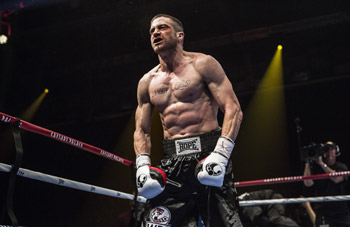 Todd Palladino and Rick Cypher, who together have a combined almost forty years of experience filming fights for HBO, found that their expertise went beyond just mere camerawork. The two, who previously had worked on The Fighter and Grudge Match, shot the film's boxing scenes exactly as they would have for actual television. Under Fuqua's direction and quest for authenticity, the matches were enacted in three-minute rounds, just as they would in a real fight. Todd Palladino and Rick Cypher used four to five cameras in their setups, with some dedicated to the look of an HBO televised match, and some for fulfilling Antione Fuqua and Fiore's more stylized vision and tighter shots. Moreover, they served as parts of the collective group who advised Fuqua on details even more than anticipated. 'I think it's very smart on the part of the producers and Antoine Fuqua to bring Tony Weeks, Jim Lampley, Roy Jones, Rick Cypher and me in to help on the fight sequences," comments Todd Palladino. 'We bring in some of the authenticity that relates to the ring: how to place the ring card girls, how a fighter would walk out of the walk-out area for his intro, where the judges would sit, where the security guards would stand, and so forth." Adds Jim Lampley of his time on set with Antione Fuqua: 'We sat down and eventually we'd start talking boxing. I'd look at my watch and wonder if I was wasting Antoine's time talking about what happened between Michael Nunn and James Tony in Davenport, Iowa in the early -90s, or if it was worth it. By and large, it was worth it because we were learning from each other and informing the venture as we went along."
Todd Palladino and Rick Cypher, who together have a combined almost forty years of experience filming fights for HBO, found that their expertise went beyond just mere camerawork. The two, who previously had worked on The Fighter and Grudge Match, shot the film's boxing scenes exactly as they would have for actual television. Under Fuqua's direction and quest for authenticity, the matches were enacted in three-minute rounds, just as they would in a real fight. Todd Palladino and Rick Cypher used four to five cameras in their setups, with some dedicated to the look of an HBO televised match, and some for fulfilling Antione Fuqua and Fiore's more stylized vision and tighter shots. Moreover, they served as parts of the collective group who advised Fuqua on details even more than anticipated. 'I think it's very smart on the part of the producers and Antoine Fuqua to bring Tony Weeks, Jim Lampley, Roy Jones, Rick Cypher and me in to help on the fight sequences," comments Todd Palladino. 'We bring in some of the authenticity that relates to the ring: how to place the ring card girls, how a fighter would walk out of the walk-out area for his intro, where the judges would sit, where the security guards would stand, and so forth." Adds Jim Lampley of his time on set with Antione Fuqua: 'We sat down and eventually we'd start talking boxing. I'd look at my watch and wonder if I was wasting Antoine's time talking about what happened between Michael Nunn and James Tony in Davenport, Iowa in the early -90s, or if it was worth it. By and large, it was worth it because we were learning from each other and informing the venture as we went along." Southpaw
Release Date: August 20th, 2015
Have You Seen This?
MORE


